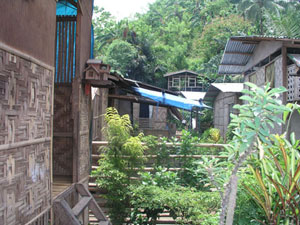For instance, Davao City used to have a budget of 40 million pesos for housing services at the time when the Urban Land Reform Program was being implemented. However, this particular only ran from 1996 up to the second half of 2004; it was suspended because the government had problems collecting payments from homeowners.

UP FOR DEMOLITION. These homes have been scheduled for demolition. (davaotoday.com photo by Barry Ohaylan)
“There were many community associations who were beneficiaries of that program that had difficulty paying back their loans,” he said. “Most of the members’ payment was not remitted by the officials of the associations,” said Cesar Dataya, officer- in-charge of Housing and Homesite Division at City Hall. These associations, which act like cooperatives, are being used as conduits in loan applications by individual homeowners.
Dataya said City Hall only managed to collect 40 percent of the whole money loaned under the program. The fact that the city, he added, also helped in finding livelihood for thes settlers apparently didn�t help.
“Right now, we do not have a fix fund for housing,” Dataya said. “If we have to buy land, it is Mayor Duterte who will look for funds. Our job is only to recommend that this is the property to buy,” Dataya explained.
The city�s homeless cannot expect help from the national government. Under the Urban Development Housing Act, the city government is mandated to take care of its housing problem.
“The key shelter agencies will only assist the LGU (local government unit) financially,� said HUDCC�s Salino. �The national agency will not give assistance if the LGU itself is not interested.”
Salino explained that the housing budget in the whole country runs up to only two billion pesos but its allocation, he said, is demand-driven. Thus, Salino encouraged LGUs and the homeless to be active in demanding for more houses so that they can get the financial assistance they need. These funds could come in the form of “soft loans” from financial agencies and will have to be shouldered by the LGU.
In the meantime, the city�s urban poor continue to face threats of demolition. Several demolitions and evacuations have been taking place in Davao City in the previous years, displacing hundreds of families, according to Kadamay. The trend is not likely to change in 2007.
In 2002, 60 families were removed from their houses in Barangay 2A in Magallanes. In 2004, 127 families were forcibly evacuated from the Dacudao part of Agdao; all their houses demolished. Early in 2006, 80 families were removed from Barresa, an area located at the back of Davao Medical Center.
The housing backlog, meanwhile, continues to grow. Government targets to put up 1.14 million houses between 2005 and 2010. Kadamay�s Depala said that number cannot meet the estimated 3.75 million houses the country�s urban poor need.
Salino agreed. “We really cannot catch up, especially if we cannot control the population. It will also depend on the financial status of the country.” Salino said the backlog for 2006 will add to the expected backlog for this year.
Depala said it is crucial that, along with providing housing, the government must also help provide jobs that give decent wages to the poor and improve their access to social services.
“Housing is considered one of the basic rights of a person as mandated in the Universal Declaration of Human Rights,” Depala said. “The issue on housing goes beyond a roof over one’s head.” (Grace S. Uddin/davaotoday.com)
[tags]davao today, davao, happy new year, 2007, housing backlog, housing rights, poverty, homeless, philippine economy[/tags]
2006: Davao Today's Year-End Series, Poverty









